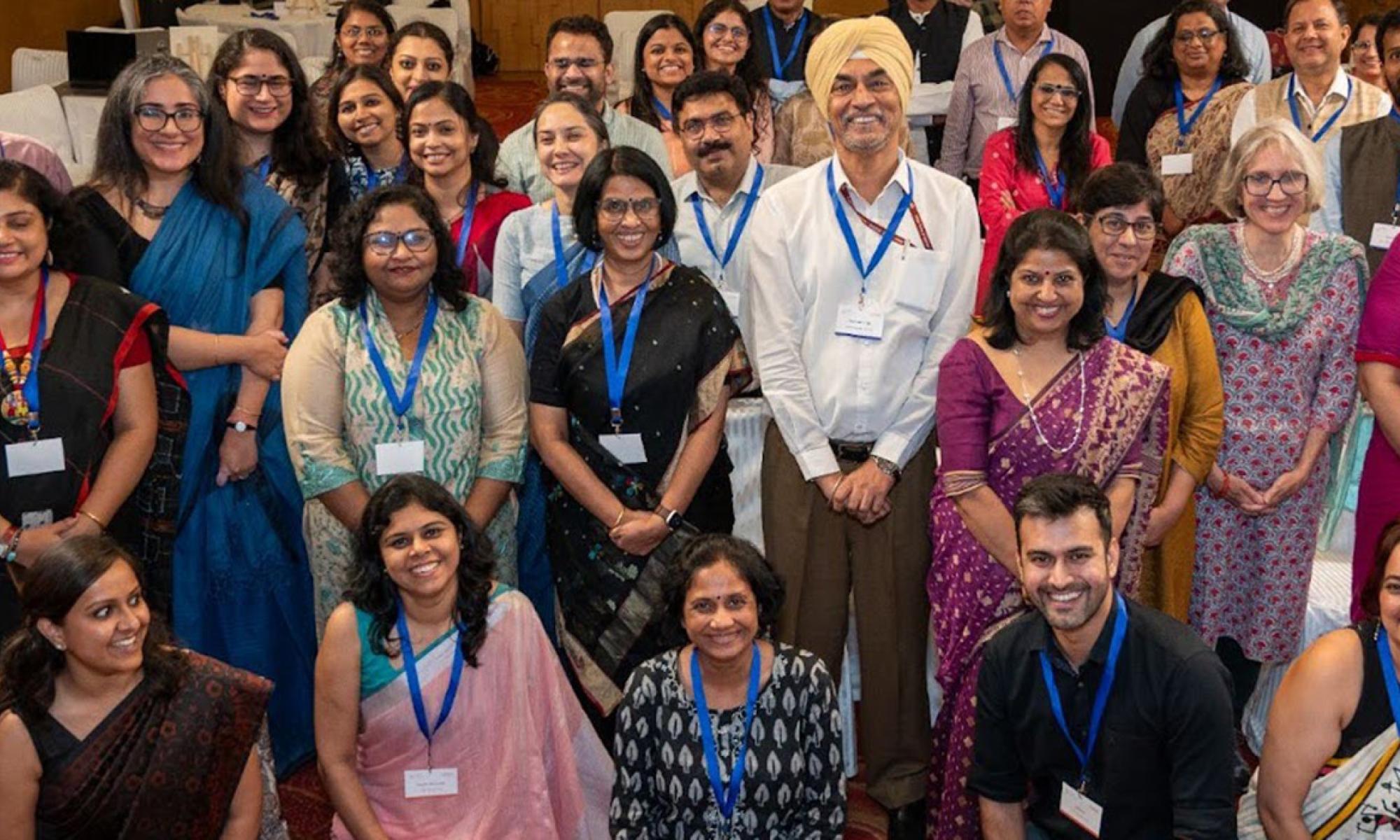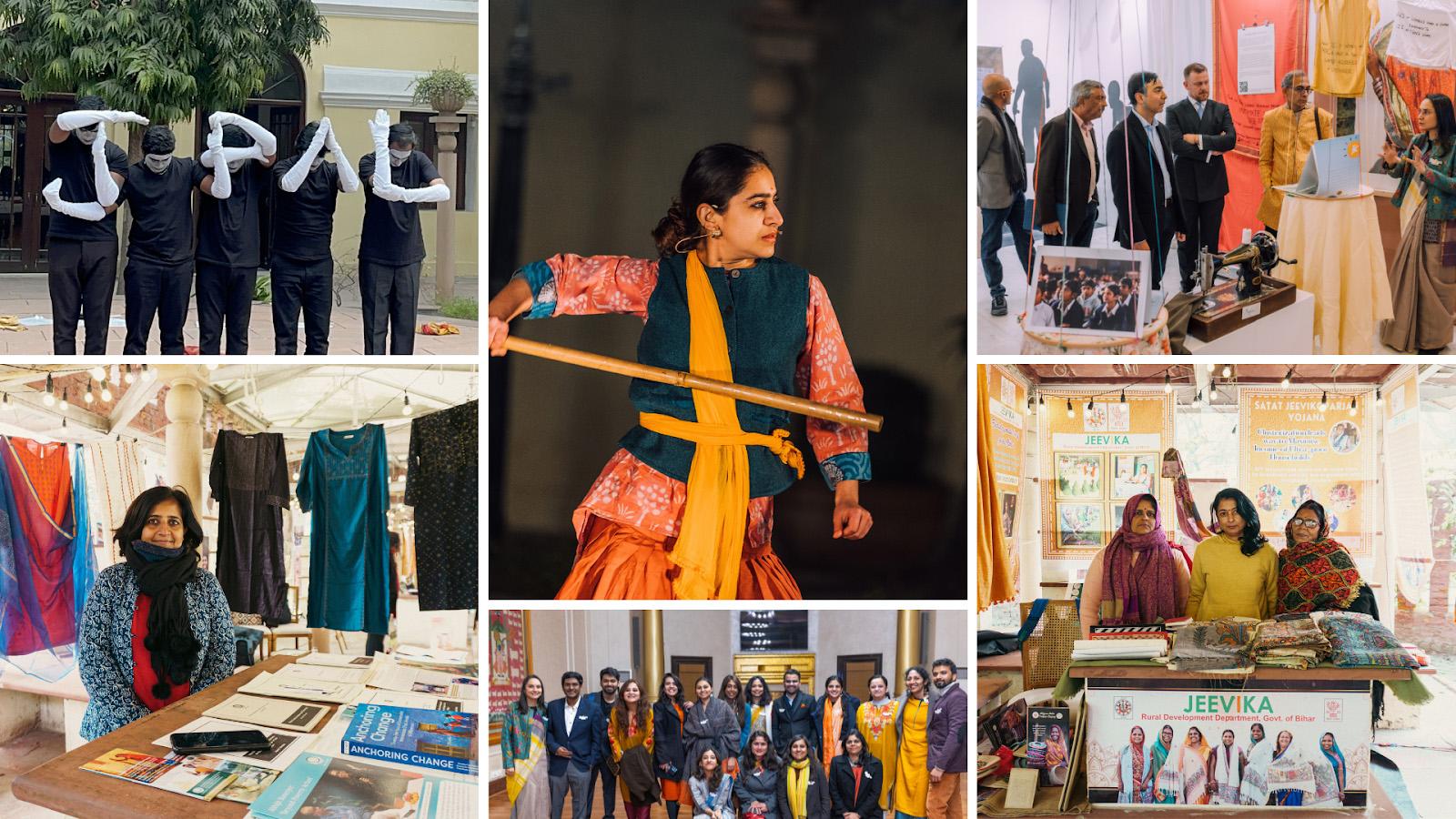
J-PAL South Asia

Hosted by

Letter from the Executive Director
For us at J-PAL South Asia, 2024 has been a year of deep reflection and eager anticipation. We began this year with our first public exhibition, Shaping Policy, Transforming Lives, held in New Delhi to celebrate J-PAL’s 20th anniversary. This event was more than a milestone; it was an expression of gratitude for the steadfast partners who have walked this journey with us and believed in our mission to address poverty through rigorous, evidence-based policy.
It reminded us not only of the insights gained and progress made but also of the ongoing work that demands our dedication. While we are proud of how far we have come, we look ahead with a renewed sense of purpose and possibility.
In March, our federal government partnerships entered an exciting new phase. The Government of India’s Ministry of Rural Development appointed us as the knowledge partner on Samaveshi Aajeevika (Inclusive Livelihoods), its flagship livelihoods program based on the Graduation Approach. It is a proud moment for all of us to see lessons from our two-decade-long journey with BRAC and Bandhan-Konnagar on Graduation Approach contributing to the Government of India’s campaign of Inclusive Growth launched by the Hon'ble Prime Minister Narendra Modi.
With our work under SARWA and our partnership with the Jal Jeevan Mission, we continue to work towards improving the access to clean air and water for millions of Indians through solutions that have been rigorously tested for effectiveness.
In keeping with our mission of making scientific thinking the cornerstone of policymaking, we launched the Case Studies in Data and Evidence for Governance course for Indian civil servants. This course now reaches over 4.6 million government officials through the Government of India’s iGOT Karmayogi platform. Using some of our seminal studies, this video case study series explains the fundamentals of randomized evaluations in a fun and engaging way.
Our continued efforts to make sure children in India are learning well received a major boost with the launch of our “learning lab” in Karnataka. Together with the state’s school education department, we will work to rapidly expand the reach of scientifically-tested policy solutions across the state. This effort stands to benefit children across age groups, from early childhood to adolescence.
Looking ahead, I’m excited about the ambitious new directions we’re taking in artificial intelligence for social impact—cutting through the hype to harness its power responsibly. One key focus will be building coalitions and accelerating efforts to support NGOs and communities of practice, making our streets and workplaces safer for women. Through targeted research and programming that addresses law and policy, social norms, and the root causes of violence, we are developing innovative solutions to combat sexual harassment and violence against women in India. At the same time, we will be putting in work to fortify India’s next generation for the future of work, equipping them with the skills and opportunities needed to thrive in an ever-evolving, AI-oriented world.
We also plan to continue our efforts to engage more deeply and meaningfully with Indian academia as we take steps towards these ambitious endeavors.
As I reflect on the past year, I am incredibly proud of our accomplishments. None of this would have been possible without my team, whose passion and dedication to our mission continue to amaze and inspire me. And to the people who have backed us—thank you for believing in us. Together we will have much to celebrate in the coming years.
Onwards and upwards.
Shobhini Mukerji
Executive Director, J-PAL South Asia
J-PAL South Asia leadership

Esther Duflo
Scientific Director

Iqbal Dhaliwal
Scientific Director

Shobhini Mukerji
Executive Director
J-PAL South Asia in Review

Catalyzing sustainable and inclusive livelihoods for India’s rural women: In March 2024, we partnered with India’s Ministry of Rural Development as the learning and knowledge partner in the consortium to support the rollout of Samaveshi Aajeevika, its flagship social protection program for the poorest of poor women. Based on the Graduation Approach—a globally recognized model to lift people out of extreme poverty—Samaveshi Aajeevika has the potential to impact millions of rural poor when fully scaled.
Creating a learning journey for policymakers: In April 2024, we launched “Case Studies in the Use of Data and Evidence for Governance,” a course for Indian civil servants on the Government of India’s iGOT Karmayogi platform. Through six exclusive video case studies, this course demonstrates the rigor that underpins randomized evaluations and their potential to transform policymaking in India.
Applying science and data to school education policies: We launched a “learning lab” with the Government of Karnataka in October 2024. The lab will enable global research insights to shape Karnataka’s school education policies while giving a boost to scientific evaluations of new and existing school education programs. Informed by evidence from the J-PAL research network, the state government has already launched Maru Sinchana and Ganitha-Ganaka to enhance learning outcomes among children.
Advancing health and climate research: Through J-PAL South Asia’s new Air and Water Lab, SARWA—Solutions and Advancements through Research for Water and Air—we are strengthening our commitment to clean air and water solutions in India. Additionally, In 2024, we awarded funding and provided project implementation support to ten Indian academics studying health and climate change under the second edition of the Indian Scholars Program (ISP).
We are currently invested in understanding how we can better forge partnerships with Indian academia. We will focus our efforts on understanding existing challenges and current opportunities, while identifying avenues for collaboration to create solutions that support the professional development needs of academics in India.
Our India Climate and Health Data Capacity Accelerator fellowship program aims to strengthen the data science capabilities of the social impact ecosystem in India and has made remarkable progress, placing 20 skilled data fellows in impactful projects that examine the effects of climate change on human health across agriculture, maternal and child health, WASH, and heat stress, among other areas.

The Year Ahead
- Investing in federal government partnerships: We will leverage our existing partnerships with the Government of India to catalyze new collaborations with state and local governments. Our work with the Ministry of Rural Development (MoRD) on Samaveshi Aajeevika and with the Department of Drinking Water and Sanitation under the Ministry of Jal Shakti on the Jal Jeevan Mission (JJM) through SARWA serves as a foundation for expanding the reach of impactful, evidence-based policy solutions.
- Harnessing AI for social good in India: Through our partnerships with the Ministry of Electronics and Information Technology (MeitY) and Government of Telangana, we will work towards catalyzing responsible and ethical use of artificial intelligence for social policies in India.
- Strengthening safety and inclusion for women: We will build coalitions and communities of practice to address violence and harassment against women. By advancing innovative, scalable solutions through research and programming, we aim to make streets and workplaces safer for all.
- Preparing India’s Youth for the Future of Work: We will focus on equipping India’s youth with skills for a dynamic future, leveraging AI and innovative programs to prepare them for emerging opportunities in education and employment.
- Building a diverse and inclusive researcher network: We will continue our efforts to forge closer ties with Indian universities and their faculty, aiming to build an equitable, inclusive, and diverse researcher pipeline in India and strengthen the research ecosystem.
In case you missed it: Highlights from 2024
- Read of a summary of a Ministry of Rural Development Roundtable on forging partnerships for inclusive development.

-
In January, J-PAL South Asia celebrated its 20th anniversary with an immersive exhibition at New Delhi’s Bikaner House, highlighting two decades of evidence-based solutions to tackle poverty.
-
J-PAL South Asia signed its first AI-focused MoU with the Government of Telangana, coming on board as the research and evaluation partner for the government’s AI initiatives
-
In a wide-ranging interview with The Indian Express, Nobel laureates and J-PAL co-founders Abhijit Banerjee and Esther Duflo talked about whether inequality is a bigger concern in India than poverty, the need for improved social mobility, why Indians should eat more protein, and much more.
-
Iqbal Dhaliwal, Global Executive Director, J-PAL, sat down with Business Standard to talk about the growing global acceptance of randomized evaluations, the importance of testing policies, and universal basic income, among other things.
-
Shobhini Mukerji shares candid insights from her journey, moving from field researcher to leading a research-to-action organization, in her three-part blog series. She reflects on lessons learned, highlighting the need to understand local contexts, adapt to setbacks, and partnering with those committed to continuous innovations and long term impact.
Lead photo credit: J-PAL